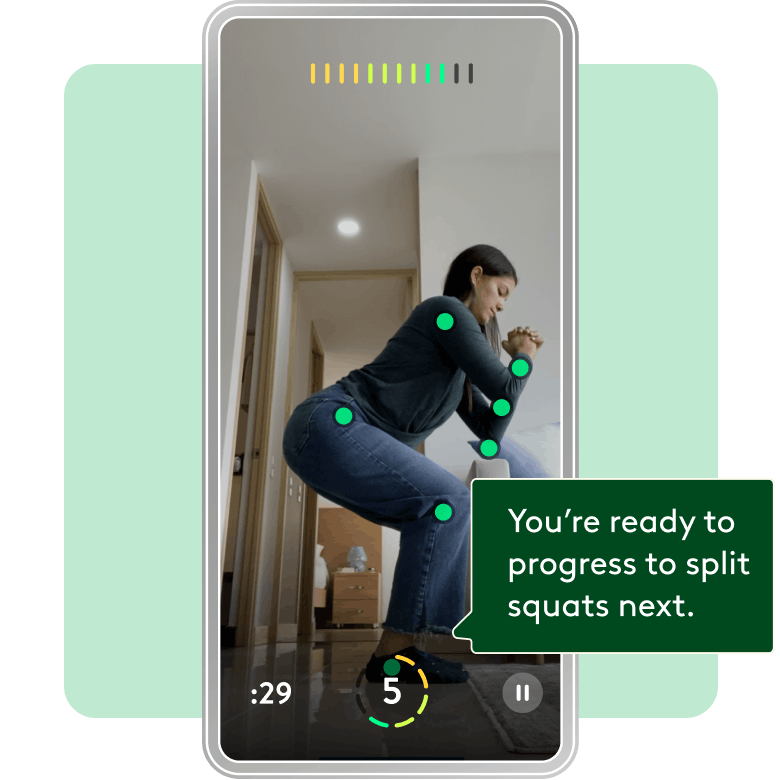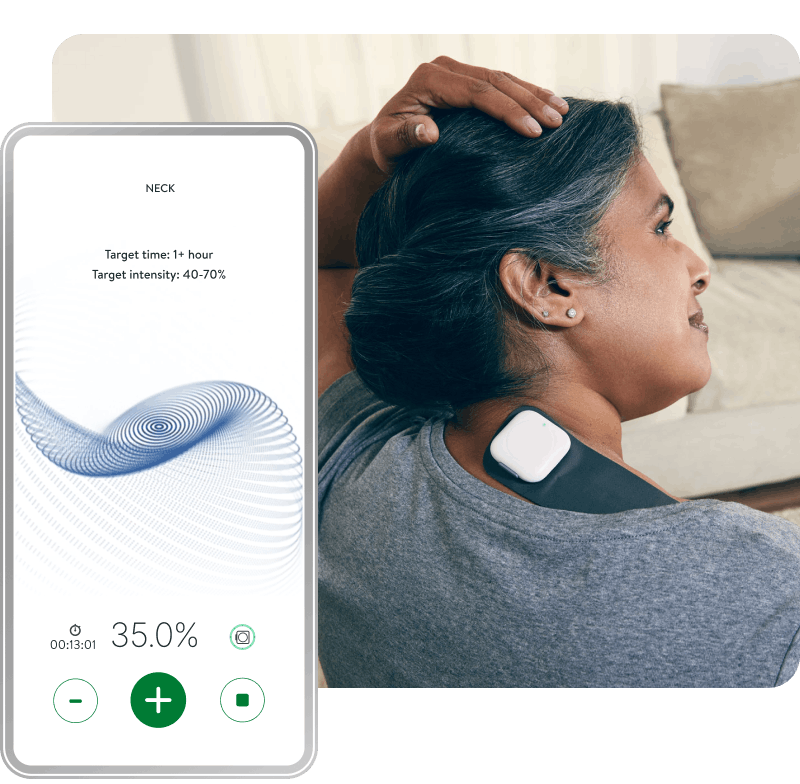Thesis
As of July 2022, musculoskeletal (MSK) disorders were the leading cause of chronic pain and disability, affecting over 1.7 billion people worldwide. MSK disorders limit mobility, lower well-being, and can even cause early retirement. MSK disorders are primarily treated through a combination of physical therapy and medication.
However, there are a variety of issues associated with current care strategies. For example, physical therapy treatment can be challenging to administer due to transportation difficulties, issues with performing home exercises, lack of home equipment, and more. Obstacles to treatment lead many patients to overlook or delay the physical therapy appointments that are necessary for the treatment of their disorders. One study conducted in 2021 showed that 73% of patients undergoing physical therapy missed appointments during their treatment period.
The challenges involved with in-person appointments are driving the growth of the digital health market. This market includes various technologies, services, and solutions aimed at improving healthcare delivery via digital platforms. Due to trends such as the increased number of aging populations across the world, a greater incidence of chronic diseases, and rising healthcare costs, there has been a shift towards adopting digital health services. The global digital health market was valued at $217 billion in 2022 and is estimated to achieve a market size of $1.6 trillion by 2032, projected to grow at a CAGR of 25.3%.
Hinge Health is a digital health company that offers virtual physical therapy services. The company’s goal is “making high-quality musculoskeletal (MSK) care accessible to everyone.” Its services include personalized, short exercise plans that can be performed at home in convenient spaces. It also provides physical therapists that are available 24/7 and are accessible via text message, phone, or video call. It also integrates AI technology that tracks patient movements as they complete exercise routines and offers feedback. In addition to its virtual services, Hinge Health offers wearable devices such as Enso, an FDA-cleared wearable technology that sends electrical relief signals to pain points.
Founding Story
Hinge Health was founded by Daniel Perez (CEO) and Gabriel Mecklenburg (Executive Chairman) in 2014. Perez had a background in biomedical engineering while Mecklenburg had experience in product management and operations prior to founding Hinge Health.
Each founder has a personal history of musculoskeletal injuries: Perez suffered multiple bone fractures in a bike accident, while Mecklenburg tore his ACL during a judo match. However, throughout their treatment process, they experienced various inefficiencies, including a disjointed care system and over-reliance on surgery and opioids. This prompted them to create Hinge Health.
Initially, Hinge Health was founded to improve the quality and accessibility of MSK care, specifically aiming to reduce chronic pain, unnecessary surgeries, and reliance on opioids. Their goal was to empower users with tools and knowledge to aid them in recovery and prevention. To do so, the founders put together a team with backgrounds in physical therapy, behavioral science, and clinical psychology to develop a solution.
That solution took the form of the Hinge Health app. Once developed, the app consisted of a variety of offerings, including the integration of wearable relief technologies, remote physical therapy consultations, comprehensive care models that also account for the mental health aspect of MSK disorders, and clinical validation for some of its methods. As of 2022, Hinge Health has over 600 employees both remotely and across offices in San Francisco, Portland, Chicago, and Minneapolis.
Some of Hinge Health’s notable hires include CTO Lalith Vadlamannati, who joined the company in 2021 after spending 13 years at Amazon as a VP of engineering. The company also has hired medical experts including physical therapists, surgeons, physicians, and medical executives with what the company describes as “expertise in patient-centered care”. This staff of “clinical experts” works directly with Hinge Health users and contributes to product development as part of a clinical advisory board.
Product
Hinge Health's products and services combine exercise therapy, wearable technology, behavioral health coaching, and patient education to digitally provide joint and muscle care for patients. This model is designed to improve patient outcomes. Hinge Health is used by employers and health plans to provide health benefits to employees and reduce healthcare costs. Hinge Health claims that users experience an average of 68% reduction in pain per participant and a 58% reduction in anxiety and depression among users.
Personalized Exercise Programs

Source: Hinge Health
Hinge Health offers personalized exercise programs tailored to the specific MSK injury that a patient may be dealing with, such as chronic back pain or knee pain. These programs are designed by physical therapists and consist of exercises and stretches that are specific to a patient’s fitness level, condition, and progress. The programs are designed to be completed within 15 minutes in inconvenient and tight spaces using objects typically available in the home. The company recommends that patients participate in its programs at least three times a week.
TrueMotion Technology

Source: Hinge Health
Hinge Health’s TrueMotion technology is powered by AI. It uses computer vision to track the entirety of the body as patients go through their exercise programs. As a patient performs each movement, TrueMotion offers live audio and visual feedback, helping the patient perfect their form and progress to more difficult movements. TrueMotion also collects data each time the exercise program is performed and analyzes it to adjust patients’ treatment plans.
Wearable Therapeutic Technologies

Source: Hinge Health
While most of its services are digital, such as exercise programs, Hinge Health also offers physical therapeutic devices that can be worn by patients in their day-to-day lives. For example, Hinge Health’s primary wearable sensor is Enso, an FDA-cleared technology that sends electrical signals to pain points to provide relief to patients with MSK disorders. Enso is wireless and attaches to the skin through an adhesive pad, which is intended to make it non-restrictive and comfortable.
Additionally, Enso is non-addictive and non-invasive, which aligns with Hinge Health’s efforts to reduce the number of unnecessary opioid prescriptions and surgeries that MSK patients generally face. Hinge Health says that 54% of Enso users report a 2x reduction in pain, 31% of users experience a 2x improvement in walking function, and 32% of users report a 1.6x increase in mobility as of July 2024.
Dedicated Physical Therapists

Source: Hinge Health
Hinge Health provides access to dedicated physical therapists who patients can connect to through email, text, phone call, or video chat. Hinge Health’s physical therapists can also visit patients and provide in-person assessments to provide further convenience to those who have minimal time to commute.
Interactive Educational Resources
Hinge Health offers a range of resources to provide the opportunity for patients to educate themselves and better understand the disorder that they are grappling with. For example, Hinge Health publishes a variety of articles describing different MSK injuries and possible care methods to help treat them.
Hinge Connect
Hinge Connect is intended to help prevent the unnecessary prescriptions and surgeries that MSK patients often deal with. Hinge Connect integrates external medical records (EMR) from over 1 million providers across 120K care sites into its digital clinic. It then monitors patients’ activity and flags select orders like opioid prescriptions or surgery referrals. The Hinge Health team can then intervene and offer less invasive and addictive alternatives to the patient. Hinge Connect also involves compiling patients’ medical records such that the team can quickly comprehend a patient’s medical background and tailor recommended treatment plans accordingly.
Market
Customer
Hinge Health’s target customers include self-insured employers because Hinge Health operates by selling to companies who want to include Hinge Health in their health plans as a benefit. Self-insured employers bear the burden of the direct costs of their employees’ healthcare, incentivizing them to find cost-effective solutions.
As Hinge Health strives to help patients reduce expensive surgeries and opioid use to treat MSK disorders, self-insured employers naturally gravitate toward the platform for its benefits more than other types of employers. Hinge Health reported having 1.3K customers and being accessible to 25 million members, including over 100 public sector clients with 4 million workers as of February 2023. Notable public sector clients included the City of Boston, The Texas A&M University System, and the American Foreign Service Benefit Plan. Some of Hinge Health’s notable enterprise customers as of January 2023 included AutoZone, Salesforce, and Verizon.
Market Size
Hinge Health operates in the digital health market. The global digital health market was valued at $217 billion in 2022 and is estimated to achieve a market size of $1.6 trillion by 2032, projected to grow at a CAGR of 25.3%. Since the COVID-19 pandemic and the forced closure of many in-person medical services, there has been an increased dependence on technology to deliver treatment. Additionally, as of 2022, only 10% of employers have a solution for employees with MSK injuries but 70% plan to adopt some MSK treatments by the end of that year.
Competition
Sword Health
Sword Health was founded in 2015 and offers digital physical therapy services, including personalized exercise routines, AI technology that offers real-time feedback, and access to specialized clinicians. In total, the company has amassed $453.5 million in funding as of July 2024 and was valued at $3 billion in a mixed primary and secondary funding round in June 2024.
Its value proposition is similar to Hinge Health. Sword Health designed its services to be accessible in inconvenient spaces to lessen the number of unnecessary patients or prescriptions that patients are given. Sword Health’s business model is also similar to Hinge Health’s as it sells to employers through their health plans rather than directly to patients.
Kaia Health
Founded in 2016, Kaia Health is a digital health company that uses AI to offer personalized feedback and programs based on a patient’s particular MSK injury and their physical condition and progress. The company has raised a total of $123 million in funding as of July 2024, including a $75 million Series C in April 2021 at an undisclosed valuation.
Kaia Health offers similar services to Hinge Health, such as its AI tools that track patients’ movements, one-on-one channels between patients and physical therapists, and educational resources for its users. Kaia Health also sells to employers that can offer its services to their employees as part of their health plans.
Include Health
Include Health was founded in 2018. Instead of focusing on a wide range of services, Include Health focuses more on one-on-one virtual physical therapy appointments. Like Hinge Health, Include Health has personalized exercise programs and AI tools that provide feedback for patients. The company has raised a total of $21.7 million in funding as of July 2024.
DarioHealth
DarioHealth was founded in 2011. It is a digital health company that specializes in the development and commercialization of technology that allows consumers to access various healthcare services through smartphones and other mobile devices. For example, it has created various devices to help patients monitor diabetes, such as the Dario Blood Glucose Monitor and the Dario Blood Pressure Monitor.
One difference between DarioHealth’s services and Hinge Health is that Hinge Health is more specialized in direct treatment for MSK disorders, whereas the range of DarioHealth’s services is much broader, spanning from diabetes to weight management. The company went public in April 2017 and had a market cap of $35 million as of July 2024.
Teladoc Health
Founded in 2002, Teladoc Health is a company that specializes in providing a broad range of healthcare services, from medical consultations for conditions like diabetes to mental health support. The primary difference between Teladoc and Hinge Health is the breadth of services offered. Both offer one-on-one consultations with medical professionals.
However, whereas Hinge Health is primarily concerned with MSK disorders, Teladoc strives to address a broader scope of issues, including mental health, weight management, and hypertension. The company went public in June 2015 and had a market cap of $1.6 billion as of July 2024.
Business Model
Hinge Health generates revenue by selling its services to various US employers and health plans. According to one Hinge Health employee, the company uses a simple pricing structure that charges per engaged employee and mainly aims to sell into the self-insured employer market.
Due to the wide range of services that Hinge Health offers, the company faces a variety of costs, including developmental costs associated with further advancing its technology, operational costs associated with the nurses, physical therapists, and other professionals that work on the Hinge Health team, customer acquisition costs, and research costs that the company incurs in efforts to stay ahead on the latest medical breakthroughs.
Some of these costs may only increase in the long term as Hinge Health continues to refine its platform. For example, any efforts Hinge Health makes to perfect its machine learning models and scale its technologies could lead to potential cost increases.
Traction
Hinge Health said that tripled its revenue in 2019 and tripled its customer base in the last six months of 2020. Hinge Health surpassed 1K self-insured employer customers in 2022, 12 months after hitting the 500 customer mark. The company reported adding more customers between October 2022 and October 2023 than the previous seven years combined.
Hinge Health reported having 1.3K customers and being accessible to 25 million members, including over 100 public sector clients with 4 million workers as of February 2023. As of July 2024, the company stated that it had over 1800 clients, worked with over 50 health plans, and covered 18 million people. One unverified source indicated that Hinge Health’s 2023 revenue was $323 million.
Valuation
Hinge Health raised a $400 million Series E in October 2021 at a $6.2 billion valuation. It claimed to have become one of the most valuable companies in digital health when it announced the round. The round was led by Tiger Global and Coatue Management, who also led the company’s Series D round. The company has raised a total of $826.1 million in funding as of July 2024.
Key Opportunities
Increased Adoption of AI in Healthcare
AI has significantly impacted the healthcare industry by streamlining tasks like decision-making, diagnosis, and enabling early detection of diseases. Hinge Health has capitalized on AI by using it to provide instantaneous feedback and suggestions on patients’ exercise forms.
In 2023, AI in healthcare faced a level of regulatory pushback due to concerns about demographical biases in models. However, digital health companies like Hinge Health which are able to effectively utilize AI tools in their products are likely to benefit from the increasing adoption of AI throughout the industry, even in the face of regulatory issues.
Regulatory Changes Favoring Telehealth
Regulations surrounding digital health loosened due to the increased reliance on digital health services during and after the COVID-19 pandemic. For example, certain Medicare restrictions on digital healthcare were permanently changed such as allowing the use of digital healthcare to treat behavioral and mental health, removing geographic restrictions on digital health services, and allowing digital health services to be delivered only through audio.
Additionally, temporary changes to Medicare regarding digital health were added at the beginning of 2023 and remain in place until the end of 2024. Medicare patients can now receive digital health services in their homes and digital health services can be offered by all eligible Medicare providers. Also, insurance and healthcare providers are now more open to offering and covering digital health services, which is crucial for companies like Hinge Health as it relies on coverage through various health plans as opposed to subscriptions.
Key Risks
Regulatory Obstacles
While there has been increased adoption of digital health technologies and loosening regulations in the post-COVID-19 era if regulation does not continue to loosen or its trajectory reverses, it could hamper the growth of digital health companies. Unresolved regulatory issues include digital health encounter requirements, compliance with federal and state laws, and the scope of practice.
These regulatory obstacles could take a considerable time to resolve. As Hinge Health continues to expand its services, regulatory obstacles could prevent it from implementing new strategies, potentially leading to stagnation or even a decline in performance.
Data Security Risks
Digital health continues to be an industry with a high potential for security risk. Incidents like the 2023 hack of 23andMe, where 6.9 million users had personal data stolen, continue to illustrate the potential risk for companies managing consumer patient data.
Hinge Health requires substantial patient data for personalized services to make some of its features work. For example, Hinge Connect requires access to patients’ medical records to facilitate necessary medical interventions. The privacy and security risks stemming from such data are significant concerns in the digital health space. Additionally, even some of Hinge Health’s physical features like Enso pose a security threat of inadvertently capturing other personal details such as picking up what is in a patient’s surroundings.
If there were any breaches of patient privacy or misuse of collected data, it could severely damage Hinge Health’s reputation. Such incidents could erode trust, prevent the company from garnering additional users, and permanently hinder its growth. Therefore, it is crucial that Hinge Health ensures robust data privacy and security measures to maintain user trust and sustain the company’s development.
Summary
As of July 2022, musculoskeletal (MSK) disorders were the leading cause of chronic pain and disability, affecting over 1.7 billion people worldwide and were primarily treated through physical therapy and medication. However, issues such as transportation difficulties and lack of home equipment often hinder effective treatment, leading to missed appointments and delayed care. This has driven the growth of the digital health market, projected to expand from $217 billion in 2022 to $1.6 trillion by 2032.
Hinge Health, founded in 2014 by Daniel Perez and Gabriel Mecklenburg, offers virtual physical therapy services, combining personalized exercise plans, AI-powered motion tracking, wearable devices like Enso, and 24/7 access to physical therapists. The company aims to improve MSK care accessibility, reduce chronic pain, and decrease reliance on opioids and surgeries. Hinge Health serves self-insured employers, boasting 1.3K customers and 25 million members.



